

Joan Didion on Self-Respect. For the past half-century, Joan Didion (b.
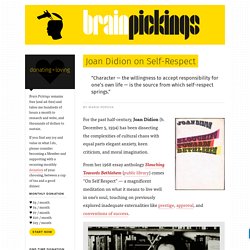
December 5, 1934) has been dissecting the complexities of cultural chaos with equal parts elegant anxiety, keen criticism, and moral imagination. The dismal fact is that self-respect has nothing to do with the approval of others — who are, after all, deceived easily enough; has nothing to do with reputation, which, as Rhett Butler told Scarlett O’Hara, is something people with courage can do without.To do without self-respect, on the other hand, is to be an unwilling audience of one to an interminable documentary that deals with one’s failings, both real and imagined, with fresh footage spliced in for every screening. There’s the glass you broke in anger, there’s the hurt on X’s face; watch now, this next scene, the night Y came back from Houston, see how you muff this one. Emotional Intelligence Training for Business: Best Practices for Success. If you’re a business leader and you want to bring emotional intelligence training to improve people-performance, where do you start?
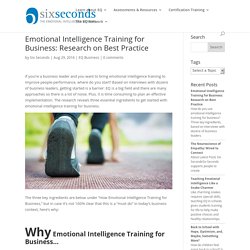
Based on interviews with dozens of business leaders, getting started is a barrier: EQ is a big field and there are many approaches so there is a lot of noise. Plus, it is time consuming to plan an effective implementation. The research reveals three essential ingredients to get started with emotional intelligence training for business. Awareness of Emotional Stimuli Determines the Behavioral Consequences of Amygdala Activation and Amygdala-Prefrontal Connectivity : Scientific Reports. The Ekmans' Atlas of Emotions. Welcome to the Atlas of Emotions This atlas was inspired by a series of conversations between the Dalai Lama and Paul Ekman about the science of emotions.

With the help of Stamen Design and Paul’s daughter, Dr. The Ekmans' Atlas of Emotions. Welcome to the Atlas of Emotions This atlas was inspired by a series of conversations between the Dalai Lama and Paul Ekman about the science of emotions.

With the help of Stamen Design and Paul’s daughter, Dr. Eve Ekman, this tool was created to be a visual journey through the world of emotions. Learn more about the work of Paul Ekman at www.paulekman.com. What it’s based on. 18 Signs Of High Emotional Intelligence. Source: www.wakingtimes.com | Original Post Date: March 27, 2015 – “Emotional intelligence is the “something” in each of us that is a bit intangible.
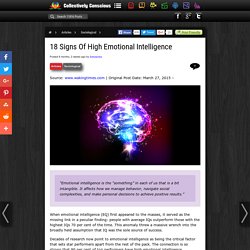
It affects how we manage behavior, navigate social complexities, and make personal decisions to achieve positive results.” When emotional intelligence (EQ) first appeared to the masses, it served as the missing link in a peculiar finding: people with average IQs outperform those with the highest IQs 70 per cent of the time. How Emotions Affect Learning, Behaviors, and Relationships. We need all of our emotions for thinking, problem solving, and focused attention.
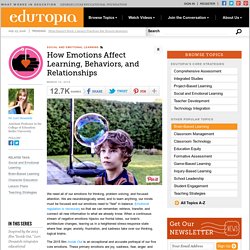
We are neurobiologically wired, and to learn anything, our minds must be focused and our emotions need to "feel" in balance. Emotional regulation is necessary so that we can remember, retrieve, transfer, and connect all new information to what we already know. When a continuous stream of negative emotions hijacks our frontal lobes, our brain's architecture changes, leaving us in a heightened stress-response state where fear, anger, anxiety, frustration, and sadness take over our thinking, logical brains.
Neuroplasticity/Feelings. How Healthy are Your Defense Mechanisms? DSQ. Primary Reference for the DSQ: Andrews, G., Singh, M., Bond, M. (1993).
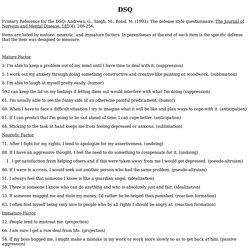
The defense style questionnaire. Social Emotional Learning, Brain Research, and Healthy Classrooms. The implementation of “social emotional learning” is a method for developing the skills of emotional intelligence.
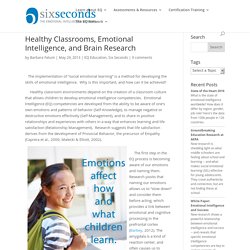
Why is this important, and how can it be achieved? Healthy classroom environments depend on the creation of a classroom culture that allows children to develop emotional intelligence competencies. Emotional Intelligence (EQ) competencies are developed from the ability to be aware of one’s own emotions and patterns of behavior (Self-Knowledge), to manage negative or destructive emotions effectively (Self-Management), and to share in positive relationships and experiences with others in a way that enhances learning and life satisfaction (Relationship Management). Research suggests that life satisfaction derives from the development of Prosocial Behavior, the precursor of Empathy (Caprera et al., 2000; Malecki & Elliott, 2002).
The first step in the EQ process is becoming aware of our emotions and naming them. How Different Cultures Around the World Deal With Emotion and Conflict. By Frank Jacobs Negotiating with Filipinos?
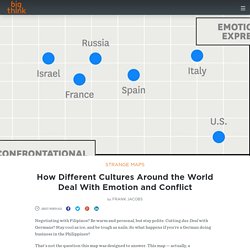
Be warm and personal, but stay polite. Cutting das Deal with Germans? Stay cool as ice, and be tough as nails. So what happens if you're a German doing business in the Philippines? That's not the question this map was designed to answer. Neuroqualia. A Parent's Resource Guide to Social and Emotional Learning. Encouraging Kindness and Empathy Cultivating Kindness and Compassion in Children (Center for Child and Family Well-Being, University of Washington, 2014) This summary of a public lecture by Kimberly Schonert-Reichl underscores the importance of promoting social and emotional learning, reviews some of the research about cultivating kindness and compassion in children, and discusses five practical strategies that parents can try.
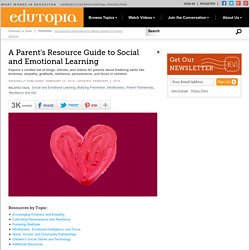
For even more parent tips, read Schonert-Reichl's Kindness Booklet. Why It’s Imperative to Teach Empathy to Boys (KQED MindShift, 2014) Gayle Allen and Deborah Farmer Kris discuss the importance of empathy and the gender stereotypes that may put boys at risk for failing to learn this important skill; the authors describe three strategies that parents of boys can implement. Can you teach people to have empathy? Empathy is a quality that is integral to most people's lives - and yet the modern world makes it easy to lose sight of the feelings of others. But almost everyone can learn to develop this crucial personality trait, says Roman Krznaric. Open Harper Lee's classic novel To Kill A Mockingbird and one line will jump out at you: "You never really understand another person until you consider things from his point of view - until you climb inside of his skin and walk around in it.
" Human beings are naturally primed to embrace this message. According to the latest neuroscience research, 98% of people (the exceptions include those with psychopathic tendencies) have the ability to empathise wired into their brains - an in-built capacity for stepping into the shoes of others and understanding their feelings and perspectives.
The problem is that most don't tap into their full empathic potential in everyday life. Harvey Deutschendorf. Why Emotionally Intelligent People Are More Successful. We've learned that emotional intelligence (EQ) is a crucial skill for both leaders and employees. But several studies point to just how important EQ can be to success, even trumping IQ and experience. Research by the respected Center for Creative Leadership (CCL) in the U.S. found that the primary causes of executive derailment involve deficiencies in emotional competence. Each year, CCL serves more than 20,000 individuals and 2,000 organizations, including more than 80 of the Fortune 100 companies. It says the three main reasons for failure are difficulty in handling change, inability to work well in a team, and poor interpersonal relations.
Empathy Is Still Lacking in the Leaders Who Need It Most. Many people and a host of commentators instinctively recoiled at the callous management practices described in a scathing New York Times article last month about Amazon. So did Jeff Bezos, Amazon’s founder and chief executive. The science behind adult colouring books - Books and Arts.
Why are colouring books at the top of Australia's adult bestseller list? Books and Arts takes a closer looking at the booming popularity of colouring books for adults to see why we're suddenly diving back into our pencil cases for the sake of mental health. Onion Studios. How high is your emotional intelligence? 7 Interview Questions That Determine Emotional Intelligence. Join us in Miami, Chicago or Denver for our Accelerate Your Business event series kicking off in February. Discover solutions to optimize team performance, improve company productivity, and position your business for continued success. See dates and details » Determining who you hire for a job plays a big part in forming your company’s culture and ensuring its future success.
Selecting informative interview questions can be a key factor in finding the right employees -- as well as weeding out the ones that won’t fit. A candidate’s answers can be telling. Quiz Yourself: Do You Lead with Emotional Intelligence? The Dark Side of Emotional Intelligence - Adam Grant. Some of the greatest moments in human history were fueled by emotional intelligence. Comment: Here’s why your terrible boss is so emotionally inept. Over the past century, the heartless, no-nonsense CEO has become something of an icon—and a cliché—in American society.
Limbic Revision: How Love Rewires the Brain. The Emotional Impulses That Poison Healthy Teams. Is anyone really an individual contributor at work anymore? I think not. Pretty much everything we do is done with others in groups. The Emotional Impulses That Poison Healthy Teams. Empathetic People Have Physical Differences in Their Brains, Study Finds. Patience - a Key Leadership Attribute. Emotional Triggers — Worlds of Comfort. When we are being emotionally triggered and the mental looping begins, it can be challenging to re-focus our mind and center within the emotional body once the mental programs and survival fears kick in. Genos Emotional Intelligence Network. What it means to "hold space" for people, plus eight tips on how to do it well - Heather Plett. What the Dalai Lama Taught Daniel Goleman About Emotional Intelligence. Two decades before Daniel Goleman first wrote about emotional intelligence in the pages of HBR, he met his holiness the 14th Dalai Lama at Amherst College, who mentioned to the young science journalist for the New York Times that he was interested in meeting with scientists.
Introvert or Sensitive: Be More Creative. As a creative person, one aspect of your personality is probably high sensitivity. Signs That You Lack Emotional Intelligence. Executive Summary.